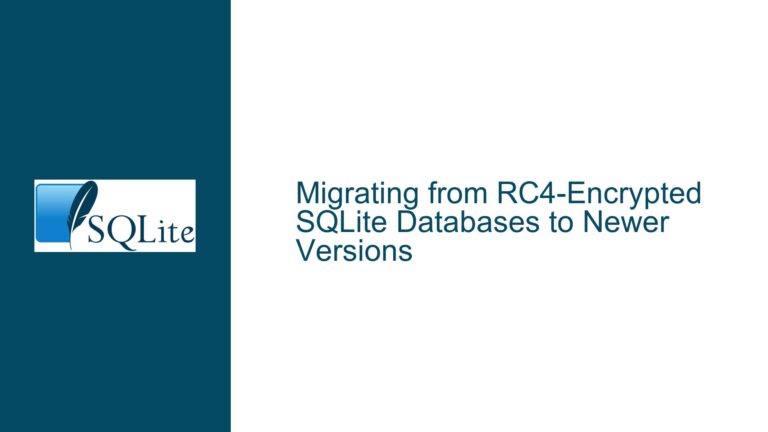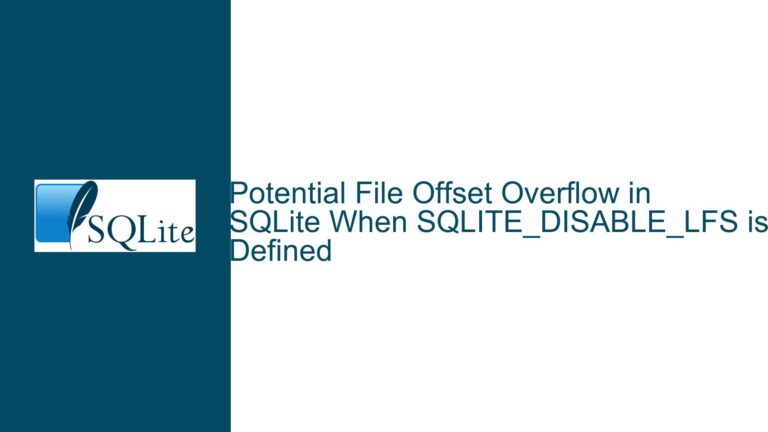Lifetime of `argv` in SQLite Virtual Table Module Methods
Lifetime Guarantees of argv in sqlite3_module::xConnect and sqlite3_module::xFilter
The core issue revolves around the lifetime of the argv parameter passed to the xConnect method of a SQLite virtual table module and whether its contents, specifically the module name stored in argv[0], can be safely referenced later in the xFilter method without deep copying. This is a nuanced topic that touches on SQLite’s internal memory management, the lifecycle of virtual table modules, and the guarantees (or lack thereof) provided by the SQLite API documentation.
Issue Overview
When implementing a SQLite virtual table, the xConnect method is called during the creation or connection to the virtual table. This method receives an array of arguments (argv), where argv[0] typically contains the module name. A common question arises: Can the pointer to argv[0] be stored and used later in the xFilter method, or does the lifetime of argv not extend beyond the execution of xConnect?
The concern stems from the need to use the module name during the xFilter method, which is invoked during query execution. If the lifetime of argv[0] is not guaranteed, storing a direct pointer to it could lead to undefined behavior, such as accessing invalid memory if the original string has been deallocated. This issue is particularly relevant when using sqlite3_value_pointer to convert the module name into a pointer type during xFilter.
The SQLite documentation does not explicitly state the lifetime guarantees for argv passed to xConnect. This lack of clarity necessitates a deeper exploration of SQLite’s internal behavior and potential sources of the argv values to determine whether relying on the pointer is safe or if a deep copy is required.
Possible Causes of Lifetime Uncertainty
The uncertainty about the lifetime of argv in xConnect stems from several factors, including the origins of the argv values and SQLite’s internal memory management practices. There are at least three potential sources for the module name passed to xConnect:
Argument from
sqlite3_create_module[_v2]: When a virtual table module is registered usingsqlite3_create_moduleorsqlite3_create_module_v2, the module name is provided as an argument. In this case, the lifetime of the module name is determined by the caller. If the caller ensures the string remains valid for the duration of the virtual table’s existence, storing a pointer toargv[0]might be safe. However, this relies on the caller’s behavior, which is not guaranteed by SQLite.Copy in SQLite Internal Structures: SQLite might store a copy of the module name in its internal structures associated with the virtual table module. If this is the case, the lifetime of
argv[0]would likely extend until the module is dropped. However, this behavior is not documented, and relying on it would be speculative.Argument from
CREATE VIRTUAL TABLEStatement: The module name could also originate from theCREATE VIRTUAL TABLEstatement. In this scenario, the string might reside in an input buffer, the SQL program created to process the statement, or another temporary location. These sources are likely to expire after thexConnectfunction returns, making any stored pointer invalid.
The lack of explicit guarantees in the SQLite documentation means that developers must consider these possibilities and err on the side of caution. Relying on the pointer without deep copying could lead to subtle bugs that only manifest under specific conditions or after prolonged use.
Troubleshooting Steps, Solutions & Fixes
To address the issue of argv lifetime in xConnect and ensure safe usage in xFilter, follow these steps:
Deep Copy the Module Name: The most robust solution is to create a deep copy of the module name during
xConnectand store the copied string for later use inxFilter. This approach eliminates any dependency on the lifetime of the originalargvvalues. Usesqlite3_mallocor a similar function to allocate memory for the copy, and ensure proper cleanup during the virtual table’s destruction.static int xConnect(sqlite3 *db, void *pAux, int argc, char *const *argv, sqlite3_vtab **ppVtab, char **pzErr) { MyVTable *pVTab = sqlite3_malloc(sizeof(MyVTable)); if (!pVTab) return SQLITE_NOMEM; pVTab->zModuleName = sqlite3_mprintf("%s", argv[0]); if (!pVTab->zModuleName) { sqlite3_free(pVTab); return SQLITE_NOMEM; } *ppVtab = (sqlite3_vtab *)pVTab; return SQLITE_OK; }In this example,
sqlite3_mprintfis used to create a copy of the module name. The copied string is stored in the virtual table instance and can be safely accessed duringxFilter.Verify Memory Management: Ensure that the memory allocated for the copied module name is properly freed when the virtual table is destroyed. Implement the
xDisconnectorxDestroymethod to clean up resources.static int xDisconnect(sqlite3_vtab *pVtab) { MyVTable *pVTab = (MyVTable *)pVtab; sqlite3_free(pVTab->zModuleName); sqlite3_free(pVTab); return SQLITE_OK; }This step prevents memory leaks and ensures that the virtual table implementation is robust and reliable.
Avoid Assumptions About
argvLifetime: Even if initial testing suggests that storing a direct pointer toargv[0]works, avoid relying on this behavior. SQLite’s internal implementation could change in future versions, leading to unexpected failures. By deep copying the module name, you future-proof your code and adhere to best practices for memory management.Test Under Stress Conditions: To validate the robustness of your solution, test the virtual table implementation under various conditions, including high-concurrency scenarios, long-running queries, and repeated creation and destruction of virtual tables. This testing helps identify any edge cases where memory management issues might arise.
Consult SQLite Documentation and Community: While the SQLite documentation does not explicitly address the lifetime of
argvinxConnect, consulting the official documentation and engaging with the SQLite community can provide additional insights. If the behavior is undocumented, consider submitting a feature request or documentation clarification to the SQLite team.
By following these steps, you can ensure that your virtual table implementation is both safe and reliable, avoiding potential pitfalls related to the lifetime of argv in xConnect. Deep copying the module name is a small price to pay for the peace of mind that comes with knowing your code will not break due to undefined behavior.






